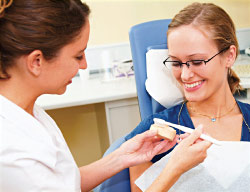Dental Hygiene Visit
A true value in dental healthcare
Dear Doctor,
When I went for a simple dental cleaning, why did the hygienist ask so many questions about my general health? I was also surprised it took so long and was expensive. Can you tell me why?

Dear Emily,
Actually, having your “teeth cleaned” is a highly individualized process. Dental hygienists are educated and trained health care professionals who operate under strict state licensing for your general health as well as your oral health. All these professional skills are put to use during a “not so simple cleaning,” with your safety and well being in mind.
Each visit begins by reviewing your health history to identify issues that may necessitate special precautions during dental hygiene care to ensure your safety and to prevent medical emergencies. For example, blood pressure monitoring may identify a risk for general health; patients with a history of heart disease may be at particular risk for dental cleaning; diet history for both your general and oral health may be discussed to name but a few issues. These assessments are important since dental hygiene care may impact upon existing health conditions, and vice versa.
Next, the hygienist carefully assesses the skin in and around your mouth looking for lumps, bumps, sores, tenderness or swellings and refers all areas of concern to the dentist for further evaluation. This is, among other things, a cancer screening. The hygienist is one of the few people who get to closely assess your whole mouth, so they are trained to spot this deadly disease and others.
Dental hygienists collaborate with dentists to provide optimum personalized oral health care to prevent oral disease and to promote your health.
Your periodontal health will also be evaluated during a routine cleaning. “Peri” means “around” and “dont” means “tooth,” so you can expect that the areas around your teeth including gum tissues will be checked for signs of inflammation and bleeding (gingivitis). In addition, the hygienist will gently measure the space between the teeth and the gums with a tiny probe; Detachment or “pocketing” may indicate periodontal disease; severe periodontal disease is associated with bone loss around the teeth. In health, the space between the teeth and gums measures 3 mm or less. “Pockets” that bleed during probing and/or that measure 4-5 mm deep, indicate gum infection and usually can be reversed with daily oral self-care at home and thorough cleaning. Pockets that measure 6 mm or greater, however, indicate a more severe gum problem that includes bone loss and may require more advanced or specialized treatment by your dentist or a periodontist, who specializes in gum care.
All of the dental hygiene care you receive is tailored specifically to your individual needs and safety.
The hygienist will also monitor teeth for signs of decay and associated risk factors, as well as the amount and location of deposits and stains on your teeth. The amount of stain and hard deposits on your teeth (“tartar” or also called “calculus”), and the degree of gum disease, all impact upon the level and cost of the treatment, and determine how soon you should return. For example, if you have little or no hard deposit on your teeth, your oral self-care is good, and your gum tissues are healthy with no past history of periodontal (gum) disease, your “recall” visit for continued care may be as long as six months.
The part of the visit you expected — scaling to remove deposits, and polishing to remove stains — will leave your mouth and teeth with that special sparkling clean feeling that keeps you coming back.
The education and demonstration portions of the visit are also individualized. Risk factors for tooth decay and gum disease may be discussed. Feedback on the effectiveness of your oral hygiene will allow for suggestions and demonstration of oral hygiene aids tailored to your individual needs; and for the provision of topical treatments such as fluoride to reduce sensitivity and promote strengthening of teeth against decay.
Most hygiene appointments vary from 45 to 60 minutes depending upon the hygienist's other duties in your particular office, for example taking dental radiographs (x-rays).
Dental hygiene is not a “one size fits all” cleaning. All of the dental hygiene care you receive is tailored specifically to your individual needs and safety, and is provided within the context of the Occupational Safety and Health Administration (OSHA) guidelines to eliminate the potential for disease transmission. Dental hygienists collaborate with dentists to provide optimum personalized oral health care to prevent oral disease and to promote your health. As you can see, much more is going on at a "simple dental cleaning" than an attractive polishing. Oral health is a gateway to general health, and your hygienist is the guardian.

